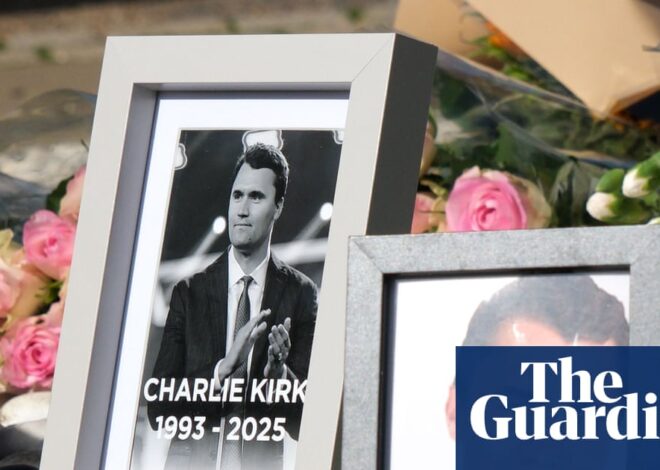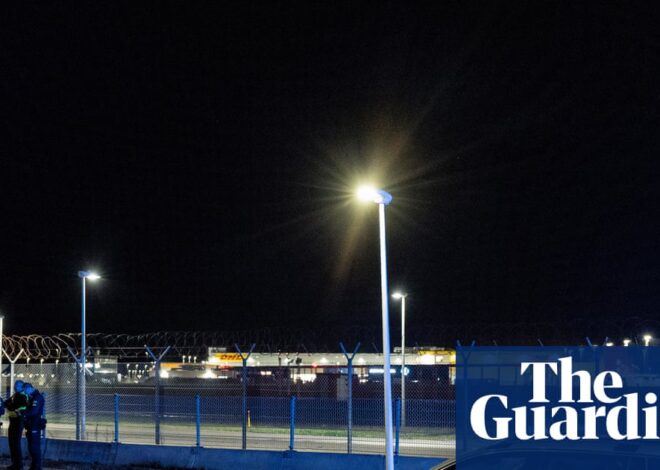
European officials warn Israel not to annex parts of West Bank in response to recognition of Palestinian state – Middle East crisis live | Palestinian territories
European officials warn Israel over West Bank annexation plans following moves towards recognition
We are restarting our live coverage of Israel’s war on Gaza and the diplomacy around it.
European officials have reportedly warned Israel not to annex parts of the occupied West Bank in retaliation for western countries recognition of Palestinian statehood.
The UK, Australia and Canada all formally recognised Palestinian statehood on Sunday, in a historic move that put three major US allies at odds with the Trump administration and drew an immediate, angry response from Israel.
Portugal also recognised Palestine yesterday, and France is among the European countries expected to do the same at the UN general assembly in New York this week.
Israeli prime minister, Benjamin Netanyahu, said yesterday that recognition rewarded Hamas’ terrorism and said “we doubled Jewish settlement in Judea and Samaria (the West Bank) and we will continue on this path”.
The Israeli far-right finance minister, Bezalel Smotrich, and Itamar Ben-Gvir, the far-right national security minister, called for wholesale annexation of the occupied West Bank in response to the declarations.
“The days when Britain and other countries would determine our future are over … The only response to this anti-Israeli move is sovereignty over the historic homeland of the Jewish people in Judea and Samaria, and permanently removing the folly of a Palestinian state from the agenda,” Smotrich wrote on X.
The UK’s foreign secretary, Yvette Cooper, has told the BBC that she has warned Israel not to annex parts of the West Bank in response to the UK’s recognition of Palestinian statehood, which has particular historic significance given the UK’s role in the creation of Israel after the second world war.
Cooper said:
We have been clear that this decision that we are taking is about the best way to respect the security for Israel as well as the security for Palestinians.
It’s about protecting peace and justice and crucially security for the Middle East and we will continue to work with everyone across the region in order to be able to do that.
Foreign Secretary Yvette Cooper says she has warned Israel not to annex parts of the West Bank in retaliation for the UK’s recognition of Palestinian statehood.
She was speaking to the BBC before attending a conference at the United Nations in New Yorkhttps://t.co/PabfJxI3N2 pic.twitter.com/N6Cbr3VzJp
— BBC Breakfast (@BBCBreakfast) September 22, 2025
The UK is to recognise a Palestinian state based provisionally on 1967 borders, before Israel occupied the Gaza Strip and West Bank. It will also pave the way for full diplomatic relations, with the Palestinian head of mission, Husam Zomlot, likely to be upgraded to full ambassadorial status.
If Israel does carry out some form of annexation of the West Bank, European officials would consider restricting trade with settlements, imposing more sanctions on violent settlers, and formally adopt an advisory opinion issued last year by the UN’s international court of justice, which found Israel’s occupation to be in violation of international law, according to the Financial Times.
Key events
The UN investigators cited examples of the scale of the Israeli killings, aid blockages, forced displacement and the destruction of a fertility clinic to back up its genocide finding.
The 1948 UN Genocide Convention defines genocide as crimes committed “with intent to destroy, in whole or in part, a national, ethnic, racial or religious group, as such”. To count as genocide, at least one of five acts must have occurred.
The UN commission found that Israel had committed four of them: killing; causing serious bodily or mental harm; deliberately inflicting conditions of life calculated to bring about the destruction of the Palestinians in whole or in part; and imposing measures intended to prevent births.
It cited as evidence interviews with victims, witnesses, doctors, verified open-source documents and satellite imagery analysis compiled since the war began two years ago.
Israel is fighting allegations at the world’s top court, the international court of justice, of committing genocide in Gaza. Israel has denied the claims.
UN investigators said last week they had determined that Israel has committed “genocide” in Gaza since October 2023, with the “intent to destroy the Palestinians” in the territory.
The United Nations independent international commission of inquiry (COI), which does not speak on behalf of the UN, found that “genocide is occurring in Gaza and is continuing to occur”, said its head, Navi Pillay.
“When clear signs and evidence of genocide emerge, the absence of action to stop it amounts to complicity,” she added. “All states are under a legal obligation to use all means that are reasonably available to them to stop the genocide in Gaza.”
The report concluded that Israel’s prime minister, Benjamin Netanyahu, as well as its president, Isaac Herzog, and the former defence minister Yoav Gallant, had “incited the commission of genocide” and that Israeli authorities had “failed to take action against them to punish” this incitement.
Israel’s ambassador to the UN in Geneva, Daniel Meron, called the report a scandalous and fake “libellous rant” that had been authored by “Hamas proxies”.
Italian cities see protests, strikes and blockades against Israel’s ‘genocide’ in Gaza
Cities across Italy on Monday saw pro-Palestinian protests, strikes and blockades responding to calls from unions to “denounce the genocide in Gaza” and for diplomatic and economic sanctions against Israel.
In Rome, hundreds of high school students gathered outside Termini train station, while there were also protests in northern cities Milan and Turin, the central city Florence and southern cities Naples, Bari and Palermo.
Dockworkers in Genoa and Livorno in the centre-north blocked the ports, according to reports. Italian dockworkers say they are seeking to prevent Italy from being used as a staging post for the transfer of arms and other supplies to Israel.
In Rome, the Italian capital, many buses were not running and the metro service was disrupted, reporters from the Agence France-Presse news agency said.
Italy’s prime minister, Giorgia Meloni, whose government is ideologically close to Donald Trump, has repeatedly voiced her “concern” over Israel’s war but reportedly does not plan on recognising a Palestinian state right now.
Rome has also expressed reluctance about implementing the EU’s proposed trade sanctions on Israel.
Malta to announce formal recognition of Palestinian state later today
Malta will announce its formal recognition of a Palestinian state at the UN general assembly in New York on Monday, the prime minister’s office said.
The Mediterranean EU island has a history of support for Palestinian causes and has backed efforts for a two-state solution, while maintaining diplomatic relations with Israel.
Malta’s prime minister, Robert Abela, first announced plans for the recognition of a Palestinian state in May, but the UN conference was postponed to a later date.
The Israeli military, which justifies its assault on Gaza City by saying it wants to “destroy Hamas military infrastructure” hasn’t given a timeline for the ground offensive, but there are indications it could take months.
Amid this flurry of diplomatic activity, Israel is continuing to launch deadly attacks on Gaza, including on Gaza City, the biggest urban centre in the territory.
Despite international opposition, Israel launched a ground offensive in Gaza City last week as the military expanded its assault on the city after weeks of intense bombardments saw entire apartment blocks reduced to rubble and forced many Palestinian people to flee southward despite there being nowhere safe to go.
The Israeli military has targeted high-rise towers in the city, telling aid workers that only hospitals will not be targeted, and ordering the city’s 1 million residents to leave.
Hundreds of thousands of residents, many of whom are too frail to flee, remain in Gaza City, where a famine – caused by Israeli restrictions on aid – has already been declared.
An overwhelming majority of Palestinian people have been forced to move numerous times during Israel’s war on Gaza and have been squeezed into increasingly small zones, which are themselves often overcrowded and subject to Israeli bombardment.
At least 15 Palestinian people have been killed in Israeli attacks across Gaza since dawn, including 12 in Gaza City, Al Jazeera is reporting.
The Israeli military said on Monday it had reinforced all “combat sectors” with air, land and naval forces across the country during the Jewish New Year holiday.
Canada yesterday became the first G7 (Group of Seven) nation to officially recognise a Palestinian state. The UK quickly followed suit, and France, which has been leading the drive towards recognition, is expected to this week.
Germany and Italy, meanwhile, which are also G7 members, have made it clear that they have no intention to do the same – at least for now.
Along with some other European governments, they believe recognition should be part of two-state negotiations, despite the prospect looking extremely unlikely as Israel’s assault on Gaza continues unabated.
As he left for the UN in New York on Monday, German foreign minister Johann Wadephul said that “a negotiated two-state solution is the path that can allow Israelis and Palestinians to live in peace, security and dignity.”
“For Germany, recognition of a Palestinian state comes more at the end of the process. But this process must begin now,” he said.
Japan, eager to maintain good relations with the US, reportedly does not intend to recognise Palestine at this moment.
What does recognition of Palestinian statehood entail practically?
The Guardian’s diplomatic editor, Patrick Wintour, has done a useful explainer with a section looking at what recognising Palestine would look like in practice. Here is an extract:
Recognition is largely symbolic. When the UK’s position was announced the then foreign secretary, David Lammy, said: “It will not change the position on the ground.”
But it allows the UK to enter treaties with Palestine and would mean that the Palestine head of mission becomes a fully recognised ambassador.
Some argue that a greater onus would be placed on the UK to boycott goods imported into the UK by Israel that come from the occupied territories.
But it is seen more as a statement on Palestine’s future, and disapproval of Israel’s refusal to negotiate a Palestinian state…
There are genuine fears that Israel is about to annex the West Bank or make Gaza so uninhabitable that Palestinians are forced over the borders into Jordan or Egypt, so destroying the possibility of a Palestinian homeland.
Recognition that Palestine is a state with the right to self-determination is an attempt to show Israel cannot simply annex land that the international court of justice has declared to be illegally occupied.
Why is the UK recognising Palestinian statehood now?

Patrick Wintour
Formally, the UK is recognising Palestine as an independent state as part of an attempt to preserve and nurture the vision of a two-state solution in which the state of Palestine coexists next to Israel.
There are genuine fears that Israel is about to annex the West Bank or make Gaza so uninhabitable that Palestinians are forced over the borders into Jordan or Egypt, so destroying the possibility of a Palestinian homeland.
Recognition that Palestine is a state with the right to self-determination is an attempt to show Israel cannot simply annex land that the international court of justice has declared to be illegally occupied.
The UK placed a set of conditions on Israel – and not the Palestinians – that if met would have meant Britain would hold back from recognition.
These were: a ceasefire in Gaza, an end to Israel’s military campaign, and a commitment to long-term negotiations on a two-state solution.
You can read more here:
On Sunday, a US state department spokesperson dismissed as “performative” the move to recognise Palestine.
“Our focus remains on serious diplomacy, not performative gestures. Our priorities are clear: the release of the hostages, the security of Israel, and peace and prosperity for the entire region that is only possible free from Hamas,” the spokesperson was quoted as having said.
Analysts in Israel suggest that Benjamin Netanyahu will make a decision on how to respond to the wave of western countries recognising an independent Palestinian state after his forthcoming trip to Washington at the end of the month.
Donald Trump has not commented on Sunday’s moves to recognition but has expressed his opposition to them in the past.
More than 150 countries are expected to have recognised Palestine by the end of next week, although some may set conditions.
Qatar welcomes recognition of Palestinian state by some western countries
Qatar has welcomed the recognition of a Palestinian state by the UK, Canada, Australia and Portugal, saying the move supported efforts to achieve a lasting peace in the region.
The UK’s deputy prime minister David Lammy, who will represent the UK at the general assembly, said yesterday that the prospects of a ceasefire between Hamas and Israel “lays in tatters” after Israel carried out an airstrike on a Hamas negotiating team in Qatar at the start of the month, which caused a huge diplomatic fallout.
Hamas said six people were killed in the attack, including the son of its exiled Gaza chief, Khalil al-Hayya. It said its top leadership, including the negotiations team, had survived.
Qatar, a close US ally, had been hosting negotiations aimed at securing a ceasefire in Israel’s war in Gaza, and has played a key role as an intermediary. It has hosted the Hamas political bureau since 2012, and hosts a large American airbase in the desert near Doha.
Last week, the US secretary of state, Marco Rubio, called on Qatar to continue to play a constructive role in bringing an end to the war and said it could help reach the goals of releasing all 48 hostages still held in Gaza, disarming Hamas and building a better future for Palestinian people.
Israeli prime minister Benjamin Netanyahu has been bullish in his defiance of international condemnation of the attack in Doha and said he did not rule out further strikes on Hamas leaders “wherever they are”.
Qatari prime minister Mohammed bin Abdulrahman bin Jassim al-Thani has called on the international community to stop applying “double standards” and to punish Israel.
European officials warn Israel over West Bank annexation plans following moves towards recognition
We are restarting our live coverage of Israel’s war on Gaza and the diplomacy around it.
European officials have reportedly warned Israel not to annex parts of the occupied West Bank in retaliation for western countries recognition of Palestinian statehood.
The UK, Australia and Canada all formally recognised Palestinian statehood on Sunday, in a historic move that put three major US allies at odds with the Trump administration and drew an immediate, angry response from Israel.
Portugal also recognised Palestine yesterday, and France is among the European countries expected to do the same at the UN general assembly in New York this week.
Israeli prime minister, Benjamin Netanyahu, said yesterday that recognition rewarded Hamas’ terrorism and said “we doubled Jewish settlement in Judea and Samaria (the West Bank) and we will continue on this path”.
The Israeli far-right finance minister, Bezalel Smotrich, and Itamar Ben-Gvir, the far-right national security minister, called for wholesale annexation of the occupied West Bank in response to the declarations.
“The days when Britain and other countries would determine our future are over … The only response to this anti-Israeli move is sovereignty over the historic homeland of the Jewish people in Judea and Samaria, and permanently removing the folly of a Palestinian state from the agenda,” Smotrich wrote on X.
The UK’s foreign secretary, Yvette Cooper, has told the BBC that she has warned Israel not to annex parts of the West Bank in response to the UK’s recognition of Palestinian statehood, which has particular historic significance given the UK’s role in the creation of Israel after the second world war.
Cooper said:
We have been clear that this decision that we are taking is about the best way to respect the security for Israel as well as the security for Palestinians.
It’s about protecting peace and justice and crucially security for the Middle East and we will continue to work with everyone across the region in order to be able to do that.
Foreign Secretary Yvette Cooper says she has warned Israel not to annex parts of the West Bank in retaliation for the UK’s recognition of Palestinian statehood.
She was speaking to the BBC before attending a conference at the United Nations in New Yorkhttps://t.co/PabfJxI3N2 pic.twitter.com/N6Cbr3VzJp
— BBC Breakfast (@BBCBreakfast) September 22, 2025
The UK is to recognise a Palestinian state based provisionally on 1967 borders, before Israel occupied the Gaza Strip and West Bank. It will also pave the way for full diplomatic relations, with the Palestinian head of mission, Husam Zomlot, likely to be upgraded to full ambassadorial status.
If Israel does carry out some form of annexation of the West Bank, European officials would consider restricting trade with settlements, imposing more sanctions on violent settlers, and formally adopt an advisory opinion issued last year by the UN’s international court of justice, which found Israel’s occupation to be in violation of international law, according to the Financial Times.


